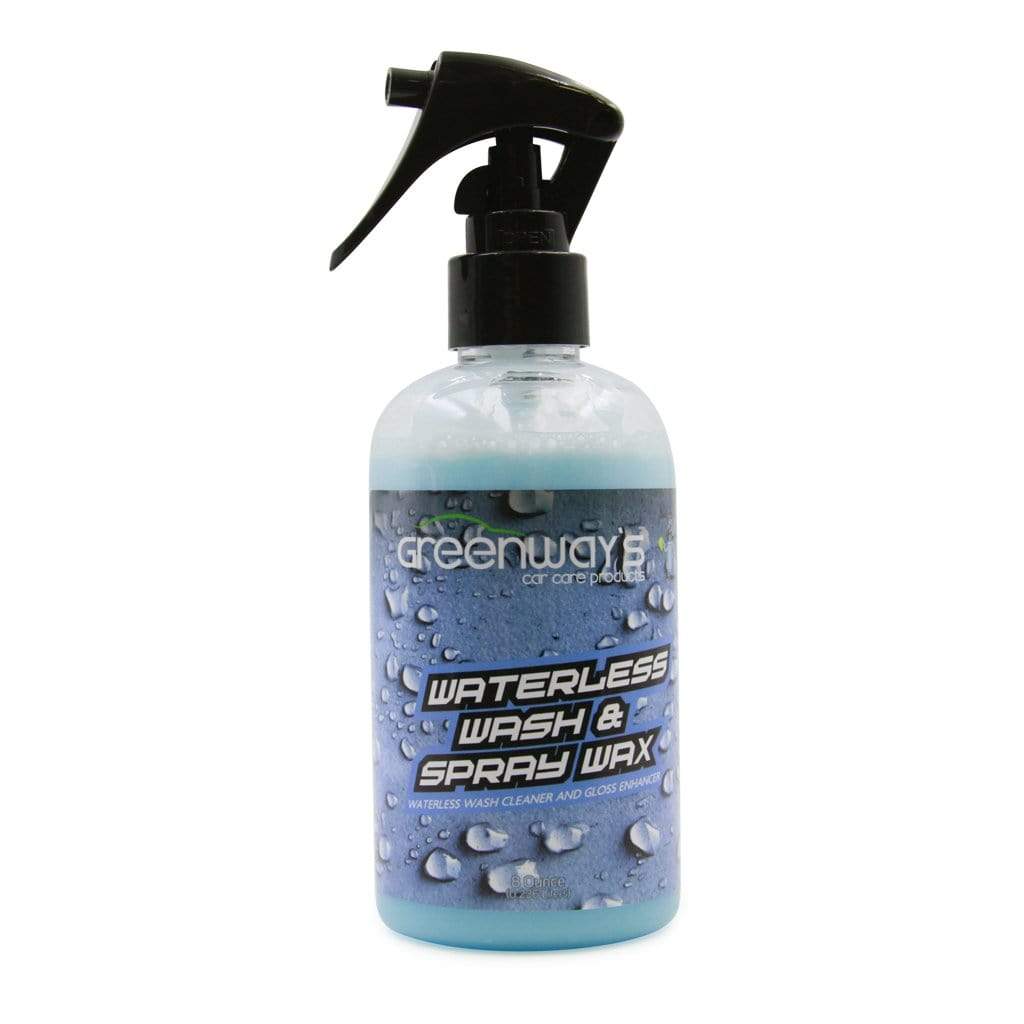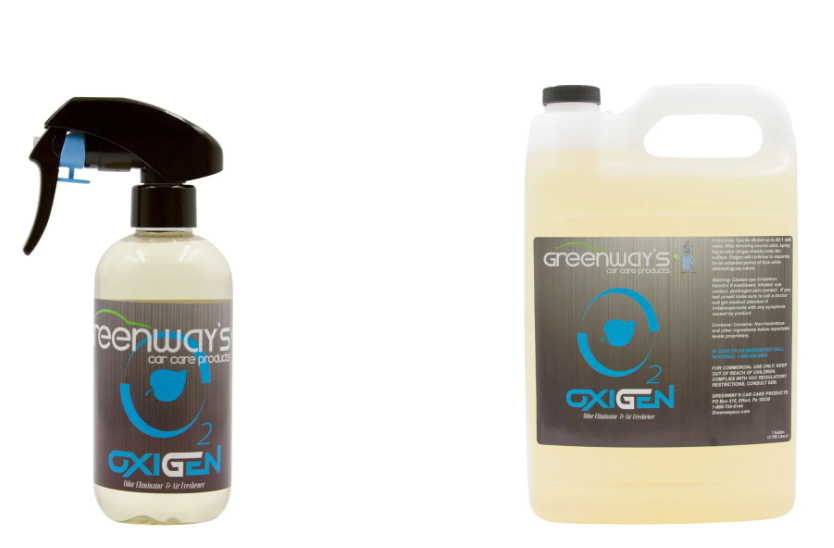Waterless Car Wash or Traditional Which is Better

Keeping your car clean is key to protecting its finish, maintaining resale value, and enhancing its overall appearance. But with options like traditional car washes and newer waterless products, the question arises: which one is better?
This guide will help you understand the benefits of each method, their ideal situations, and Greenway's help you make the best choice for your vehicle.
Why Choosing the Right Wash Method Matters
Car washing isn’t just about keeping your vehicle looking nice; it’s about long-term care. With regular washing, you can remove contaminants that corrode paint, dull the finish, and decrease the vehicle’s value. However, there are different methods, each with unique benefits and drawbacks. Deciding between a traditional wash and a waterless wash can depend on your car’s condition, location, and environmental concerns. Let’s break down these options to see what might be best for you.
What is Waterless Car Wash? Benefits and Ideal Situations
What Is a Waterless Car Wash?
A waterless car wash uses specially formulated sprays designed to clean, polish, and protect your car's exterior without needing water. These sprays typically contain lubricants and cleaning agents that lift dirt and grime from the surface, allowing you to gently wipe them away with a microfiber towel. In most cases, you’ll need only two main products: a waterless car wash solution and microfiber cloths, making it a simple and convenient option.
Benefits of Waterless Car Washes
- Eco-Friendly: Waterless washes reduce water usage, which is especially important in drought-prone areas. They help conserve this precious resource and minimize runoff that could carry pollutants into local water systems.
- Convenience: No need for a hose or large amounts of space. A waterless wash can be done in a garage, driveway, or even in a parking lot, making it ideal for people with limited access to water.
- Portability: With just a bottle of wash solution and a microfiber cloth, you can clean your car anywhere. This is great for road trips, events, or a quick spruce-up before important occasions.
- Quick and Effective: Waterless solutions are formulated to add a shine to your car while cleaning it, often making it appear freshly waxed.
Ideal Situations for a Waterless Wash
A waterless wash is perfect for lightly soiled cars that need a touch-up rather than a deep clean. It’s ideal in urban areas with limited washing spaces or during water restrictions. However, it may not be the best choice for cars with heavy mud, caked-on dirt, or significant dust from off-roading.
Traditional Car Wash – Benefits and Best Practices
What Is a Traditional Car Wash?
A traditional car wash typically involves rinsing, soaping, and rinsing again, followed by drying. This method uses significant water, which can be done at home with a hose or at a professional wash facility. Some traditional washes include added steps, like waxing or polish, to protect your car's paint.
Benefits of Traditional Car Washes
- Thorough Cleaning: Traditional washes are excellent for heavily soiled vehicles, effectively removing mud, dust, and other buildup that waterless washes may struggle with.
- Customization: When washing by hand, you can focus on specific areas, adding extra attention where needed, which is beneficial for older or specialty vehicles.
- Extra Protection: Many traditional car washes offer options like wax and sealant, which add layers of protection and enhance your car’s shine.
- Suitable for All Levels of Dirt: Whether your car is lightly dusty or covered in mud, a traditional wash can handle the job.
Best Practices for a Traditional Car Wash
To prevent scratching, start by rinsing the vehicle thoroughly to remove loose debris. Use a soft mitt with soap designed for car finishes, working in sections and rinsing frequently. Finish with a quality drying towel or chamois to avoid water spots.
Comparing the Two – Environmental Impact, Cost, and Effectiveness
When comparing waterless car washes to traditional methods, several factors come into play.
Environmental Impact
- Waterless Car Wash: Waterless options are more eco-friendly, using only a small amount of product, which is often biodegradable. They help reduce water consumption significantly, making them an environmentally conscious choice.
- Traditional Car Wash: A traditional car wash can use anywhere from 20 to 50 gallons of water per wash. Additionally, the runoff from soap and contaminants can end up in the sewer system or nearby waterways unless properly managed.
Cost
- Waterless Car Wash: The cost of a waterless car wash mainly involves the cleaning solution and microfiber towels, which can be reused. Though individual products may seem pricier, they last multiple washes, balancing out the expense.
- Traditional Car Wash: DIY traditional washes are generally affordable, requiring only soap, water, and some tools. Professional services, however, can be more costly, especially when opting for added services like waxing.
Effectiveness
- Waterless Car Wash: Effective for light cleaning and adding a polished finish, waterless products are great for maintaining a clean look between deeper washes.
- Traditional Car Wash: Better suited for deeply soiled cars, traditional washes provide a more intensive clean and are often preferred for vehicles exposed to heavy dirt, mud, and road salt.
Customer Feedback on Waterless Wash Products
Waterless car wash supplies products have garnered a range of customer feedback. Many users appreciate the convenience and environmental benefits, praising products that deliver a high-gloss finish without water. Common points of satisfaction include:
- Ease of Use: Many customers find waterless washes straightforward and perfect for a quick clean.
- Quality of Shine: Products like the “EcoGloss Waterless Wash & Shine” are often celebrated for their wax-like finish that lasts.
- Environmental Benefits: Users in dry areas or during water restrictions appreciate the waterless option as a more sustainable approach.
Some users note that waterless washes may struggle with deep-cleaning needs, particularly for vehicles exposed to heavy mud. For these cases, they recommend using it alongside traditional methods rather than as a full replacement.
Choosing the Right Method for Different Car Types and Finishes
Certain vehicles may benefit more from one wash method over the other, depending on their type, finish, and usage.
- Luxury and Show Cars: A waterless car wash can be ideal for luxury cars that require frequent, gentle cleaning. This method is less abrasive and reduces the risk of water spotting.
- Daily Commuters: Traditional washes are often suitable for daily drivers exposed to regular dirt and grime. Combining both methods can also work, using a traditional wash for deeper cleans and waterless products for maintenance.
- Off-Road or Heavily Soiled Vehicles: For SUVs or trucks frequently exposed to mud, a traditional wash is more effective. However, waterless products can still be used for in-between touch-ups.
- Vehicles with Matte or Specialty Finishes: Some specialty finishes may be sensitive to traditional wash chemicals. Waterless products formulated for matte finishes can provide a gentler solution.
Frequently Asked Questions (FAQs) about Waterless Wash
Q: Is a waterless car wash safe for all car finishes?
A: Most waterless car washes are safe for all types of paint finishes, but it’s best to check the product label if your car has a matte or specialty finish.
Q: Can a waterless wash remove bird droppings and tree sap?
A: Yes, but if they’ve dried or hardened, you may need to pre-treat them to soften before wiping with a waterless wash product.
Q: How often should I use a waterless wash?
A: For light maintenance, every 1–2 weeks is ideal, depending on the car’s exposure to dirt and dust.
Q: Is waterless wash effective on windows and chrome?
A: Yes, many products work well on windows, chrome, and trim, adding a streak-free shine.
Choosing Your Best Option and Our Recommended Products
In the end, your choice depends on your car’s condition, local water restrictions, and cleaning needs. A waterless car wash is perfect for light maintenance and environmental conservation, while a traditional wash provides a deeper clean for vehicles exposed to more dirt. Many car owners find that a combination works best, using a traditional wash for deep cleans and a waterless product for maintenance.
Ready to try a waterless car wash?
Explore our Exterior Master collection for top-rated waterless wash products that protect and shine, providing an eco-friendly alternative to keep your vehicle looking its best.


